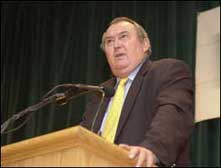 The presentation will be made by Dr Richard Leakey and is entitled "Wildlife management in East Africa – Is there a future?".
The presentation will be made by Dr Richard Leakey and is entitled "Wildlife management in East Africa – Is there a future?".The lecture takes place at 7.30pm on Thursday 15 March 2007 at the Royal Geographic Society, 1 Kensington Gore, London SW7. Tickets will be £12, with a pay bar before and after the Lecture, and they are available now from www.savetherhino.org or Zoe at Save the Rhino, Email: zoe_AT_savetherhino.org.
Save the Rhino International and the Environmental Investigation Agency are co-hosting the Fifth Douglas Adams Memorial Lecture, a talk by Dr Richard Leakey, on Thursday 15 March at the Royal Geographic Society in London SW7. In this talk, Dr Leakey will draw on his own experiences in Kenya, as founder and Director of the Kenya Wildlife Service and as the Head of Kenya's Civil Service to reflect on the successes, current problems and future challenges.
Richard Erskine Leakey was born on 19 December 1944, the second of Louis and Mary Leakey's three sons. Quickly following in his parents’ footsteps, his first career was in the field of paleoanthropology, with many important finds including (with Alan Walker in 1984), "Turkana Boy," a Homo erectus roughly 1.6 million years old, one of the most complete skeletons ever found. In 1968, aged just 24, Richard Leakey was appointed Director of the National Museums of Kenya.
In 1989 Richard left his post to become Director of the Kenya Wildlife Service. In this capacity, he spearheaded efforts to end rampant elephant poaching, but he made political enemies in the process. Nonetheless, the elephant population has since stabilised and continues to grow. In 1993 Leakey survived a serious plane crash and the following year he resigned as director of the Kenya Wildlife Service, though he continues to be active in political and environmental arenas.
As the former Director of Kenya's National Museums and former director of the Kenya Wildlife Service, he has used his leadership skills and considerable influence to raise money for the preservation of Kenyan culture and wildlife. Never one to back down on a challenge, in 1995 Richard Leakey took a stand against corruption in Kenya’s government by forming Safina, an opposition party. Despite being subjected to beatings, death threats, and constant government surveillance, Leakey has continued his crusade for political justice. Although no longer active in fieldwork, Dr Leakey, as one of the foremost authorities on wildlife and nature conservation, continues to educate others about the dangers of environmental degradation through his many lectures and books.
The lecture is in aid of Save the Rhino International and the Environmental Investigation Agency, two charities supported by Douglas Adams. Douglas developed his deep-seated interest in wildlife conservation during a 1985 visit to Madagascar, which eventually resulted in a book (Last Chance to See) about the plight of species facing extinction. Douglas Adams died unexpectedly in 2001 at the age of 49. These Memorial Lectures continue to explore the themes in which Douglas was so interested.
Dr Leakey’s books include: Wildlife Wars: My Battle to Save Kenya's Elephants(paperback, August 2002, PanMacmillan, RRP £7.99); The Sixth Extinction: Biodiversity and Its Survival
with Roger Lewin (paperback, November 1996, Phoenix Press, RRP £7.99); and Origins Reconsidered: In Search of What Makes Us Human
also with Roger Lewin (paperback, October 1993, Abacus, RRP £10.99).
Douglas Adams created all the various and contradictory manifestations of The Hitchhiker’s Guide to the Galaxy: radio, novels, TV, film, computer games, stage adaptations, comic book and bath towel. For more information about Douglas Adams and his creations, please visit www.douglasadams.com
The Environmental Investigation Agency (EIA) is an international campaigning organisation committed to investigating and exposing environmental crime. Since 1984, EIA has used pioneering investigative techniques all over the world to expose the impact of environmental crime and to seek lasting solutions. More info at www.eia-international.org
Save the Rhino International works to conserve genetically viable populations of critically endangered rhinoceros species in the wild. We do this by providing financial and in-kind support for rhino- and community-based conservation projects in Africa and Asia. More info at www.savetherhino.org
Tickets are on sale now. Simply download the form and send it in with your cheque, alternatively phone the office on 0207 357 7474 and pay over the phone.
No comments:
Post a Comment